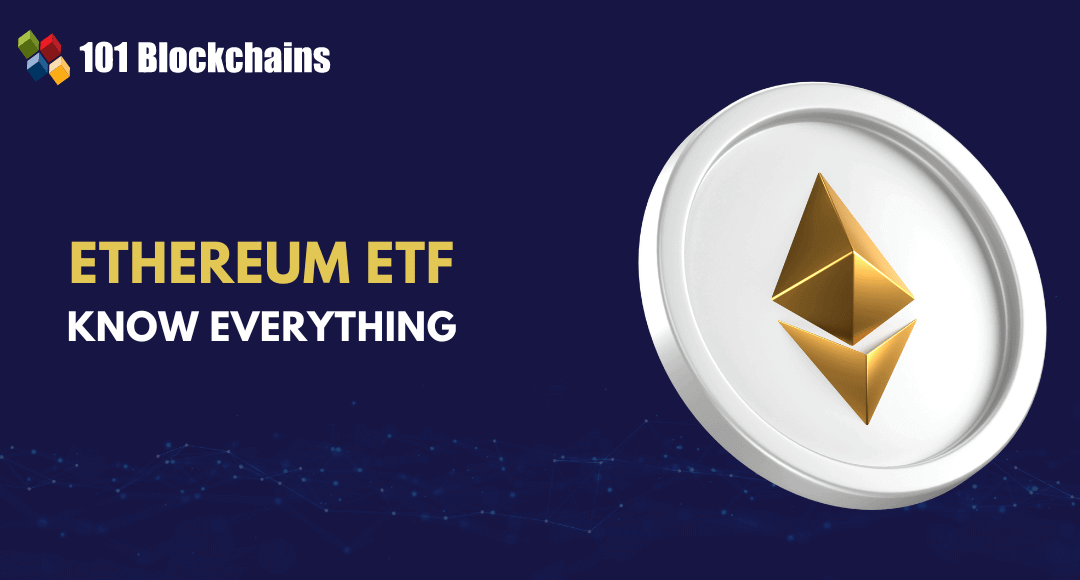The popularity of Bitcoin ETFs had created concerns regarding the possibilities for approval of Ethereum ETFs. The good news for anyone interested in ETFs is that the US Securities and Exchange Commission has issued approval of eight Ethereum ETFs. Your curiosity to learn Ethereum ETF fundamentals might stem from the identity of Ethereum as a frontrunner in the cryptocurrency market. Ethereum has consistently achieved new milestones with its smart contract programming abilities that offer new prospects for the dApp ecosystem.
Ethereum ETFs can open the doors for institutional investors to diversify their portfolios with an innovative asset. The approval of ETH ETFs could also boost the adoption of Ethereum as well as its pricing. Let us learn more about Ethereum ETFs and how they work.
Embrace the technological leap and global adoption that awaits in the upcoming bull run of 2024-2025 with Crypto Bull Run Ready Career Path
Understanding the Definition of Ethereum ETFs
You are likely to find multiple definitions of Ethereum ETFs on different platforms. The most accurate answer to “What is Ethereum ETF?” describes them as a collection of securities that represent the value of Ethereum. With Ethereum ETFs, investors don’t have to buy Ethereum directly on cryptocurrency exchanges. After the SEC approval for Ethereum ETFs, you can invest in ETFs on popular stock exchanges.
The availability of Ethereum ETFs is a promising news for traditional investors. Investors can make the most of the price movements of Ether on regulated platforms. You don’t have to worry about the complexities of crypto exchanges or digital wallets to access Ethereum ETFs. Ethereum exchange traded fund are distinct types of investment funds that follow the market value of Ether and allow investors to capitalize on the benefits of crypto markets.
You can find out how to buy Ethereum ETF in almost every guide on Ethereum ETFs. Ethereum ETFs are listed on traditional stock exchanges and do not require buyers to have a wallet or interactions with crypto exchanges. Investors without intricate knowledge of the technical aspects of cryptocurrencies can make the most of market movements of Ethereum with ETFs. Exchange traded funds remove the burden of dealing with the complex elements of digital asset management.
Enroll now in the Ethers.js Blockchain Developer Course to develop an in-depth understanding of smart contracts and their uses for creating secure and efficient Ethereum transactions.
Working Mechanisms of Ethereum Exchange Traded Funds
Ethereum ETFs offer exposure to the price movements of Ethereum without purchasing and holding Ether directly in your wallets or crypto exchanges. Almost every Ethereum ETF guide shows that the exchange traded fund invests in Ethereum or Ethereum-related assets on your behalf. The two most crucial elements in the working of Ethereum ETFs include the structure and purchase method and the exposure to Ethereum price movements.
The structure and purchase method focuses on setting up the fund. Fund managers create a fund to track price movements of Ethereum to set up Ethereum ETFs. You can easily purchase or sell shares of the fund through conventional stock exchanges. This method is simpler and less complicated than using crypto exchanges.
After discovering how to buy Ethereum ETF, you must think of the next steps to capitalize on ETFs. Investors don’t have to worry about managing their Ether ETFs as they are linked directly to Ether prices. Fluctuations in the value of Ethereum leads to changes in the value of Ethereum ETFs with the same proportion. Ethereum ETFs can help investors in speculation on pricing of Ether without ownership of the cryptocurrency.
Learn about the basic concepts of Ethereum, such as transactions, addresses, consensus, blocks, and important tools with the Ethereum Technology Course.
Common Variants of Ethereum ETFs
Ethereum ETFs are available in two different variants. You must learn Ethereum ETF fundamentals with attention to the types of Ethereum ETFs to pick the ideal variant according to your needs. The two variants of Ethereum ETFs, spot ETFs and futures ETFs, offer distinct traits and work in different ways.
Spot ETFs are funds that serve as massive digital wallets that hold Ether directly in the fund. Ethereum spot ETFs offer direct price exposure by mirroring the real-time Ethereum price movements. The value of the Ethereum spot ETF would change according to fluctuations in the real-time pricing of Ethereum. If the price of Ether increases by 20%, the value of the ETF would also increase by the same range. The special highlight of Ethereum spot ETFs is that the fund manager would have to buy actual Ether tokens.
Ethereum futures ETFs have gained popularity after the Ethereum ETF approval for their unique working mechanism. Futures ETFs do not hold actual ETH tokens like the spot ETFs. Futures ETFs invest in futures contracts that specify conditions for purchasing or selling ETH tokens at a specific price in future. Ethereum futures ETFs rely prominently on speculations rather than real-time ETH prices.
It is also important to remember that you can access Ethereum futures contracts through listings on commodities exchanges. The futures contracts offer direct exposure to price movements of Ethereum without the problems of direct ownership. The performance of the futures contracts determine the value of Ethereum futures ETFs.
Build your identity as a certified blockchain expert with 101 Blockchains’ Blockchain Certifications designed to provide enhanced career prospects.
Is Ethereum Spot ETF Better Than Futures ETF?
The primary difference between Ethereum spot ETFs and futures ETFs ultimately rounds up on the direct exposure to Ether pricing. After learning the answers to “What is Ethereum ETF?” you must differentiate between spot ETFs and futures ETFs. The differences between spot ETFs and futures ETFs help you identify the better alternative. Investors must compare the benefits and setbacks of both types of ETFs to make the most of Ethereum ETFs.
Spot ETFs involve direct ownership of ETH tokens and offer exposure to real-time price movements of Ethereum in crypto markets. Futures ETFs rely on the expected value of Ether at a specific point of time in future. Go through some of the notable implications associated with the two types of Ethereum ETFs.
Spot ETFs buy ETH tokens directly and store them in a basket fund. The value of spot ETFs is directly related to the existing market price of Ether. Spot ETFs can offer real-time exposure to price movements of Ether. You can think of Ethereum spot ETFs as huge digital wallets that store ETH on your behalf. Spot ETFs address concerns such as ‘how to buy Ethereum ETF’ with the assurance of secure storage.
It is important to remember that purchasing and selling ETH through spot ETFs can affect the market demand and supply. Direct exposure to ETH price changes makes spot ETFs more vulnerable to market volatility of Ethereum. The popular examples of Ethereum spot ETFs include Evolve Ethereum ETF and Purpose Ethereum ETF.
Ethereum futures ETFs invest in contracts that specify conditions for purchasing or selling ETH at a specific price in future. Futures ETFs rely primarily on speculation of the potential price of Ether in future. As compared to spot ETFs that mirror the present value of ETH, futures ETFs require more risk tolerance. The Ethereum ETF approval propelled the rise of Ethereum futures contracts with popular names such as VanEck Ethereum Strategy ETF. Ethereum futures ETFs bet on the price of ETH expected tomorrow rather than its today’s price.
The foremost advantage of Ethereum futures ETFs is the freedom from complexities of digital asset custody. Futures ETFs can easily resolve the security concerns that come with holding cryptocurrencies directly in your fund. The trading of futures ETFs has limited impact on the market demand and supply of Ethereum.
Ethereum futures ETFs present certain complexities in the form of additional costs involved during their rollover. Futures ETFs expose investors to the volatility of Ethereum and futures markets. Investors with higher risk tolerance and in-depth understanding of the futures markets can work effectively with Ethereum futures ETFs. You must also look out for periodic contract renewals that bring additional costs.
The most important factors that you must keep in mind while choosing between spot ETFs and futures ETFs include investor preference and risk and exposure.
Excited to learn the basics of cryptocurrency and the ways in which blockchain technology empowers cryptocurrencies, Enroll now in the Cryptocurrency Fundamentals Course
How Will the Approval for Ethereum ETFs Change Everything?
The eagerness of investors to learn Ethereum ETF basics has increased after the SEC approved Ethereum ETFs. Approval of Ethereum ETFs would have a formidable impact on the crypto market with sudden growth in popularity of Ethereum. Investors could capitalize on the benefit of easier accessibility through ETFs and enhance the prospects for mainstream adoption of Ether.
Exchange traded funds offer a regulated approach for investing in Ether. Institutional investors can trust the elements of security and privacy in Ethereum ETFs. It would lead to substantial growth in the inflow of institutional capital thereby ensuring stability and maturity of the market.
The SEC Ethereum ETF approval is likely to create a ripple effect in the crypto industry and encourage the rise of innovative crypto-related financial solutions. Ethereum ETFs may also pave the path for establishing comprehensible legal frameworks and regulatory guidelines for crypto investments.
Familiarize yourself with the popular blockchain network, Ethereum, and ensure overall, comprehensive skill development with Ethereum Skill Path
Final Words
The approval for Bitcoin ETFs in January 2024 created hopes for the introduction of Ethereum ETFs. Ethereum exchange traded funds would mark a milestone in the evolution of the cryptocurrency landscape, especially for investors. The Ethereum ETF guide showcased the potential reasons for which institutional investors might take interest in ETFs. Ethereum ETFs take away the complexities and security concerns associated with digital asset management.
The impact of Ethereum ETFs on the broader crypto market is also visible in the availability of two different variants of ETFs. Investors can choose spot ETFs or futures ETFs according to their requirements and financial goals. Enroll now in the crypto bull run ready career path to learn more about cryptocurrency ETFs and how they can revolutionize the crypto market now.
*Disclaimer: The article should not be taken as, and is not intended to provide any investment advice. Claims made in this article do not constitute investment advice and should not be taken as such. 101 Blockchains shall not be responsible for any loss sustained by any person who relies on this article. Do your own research!








